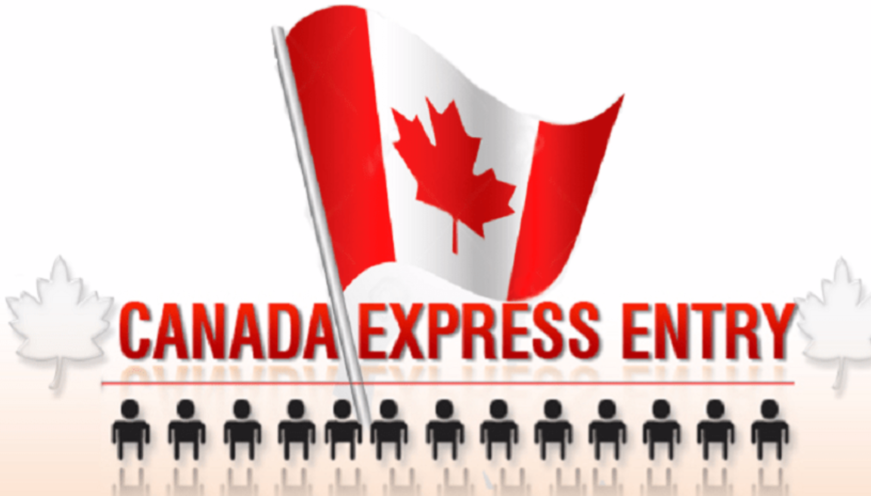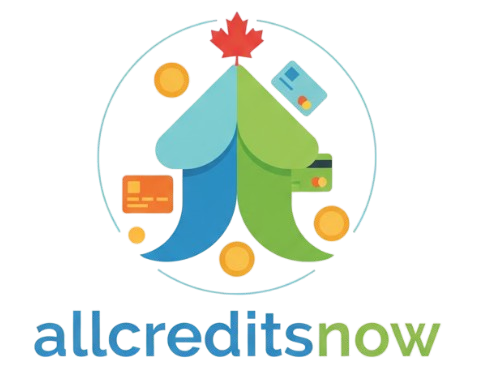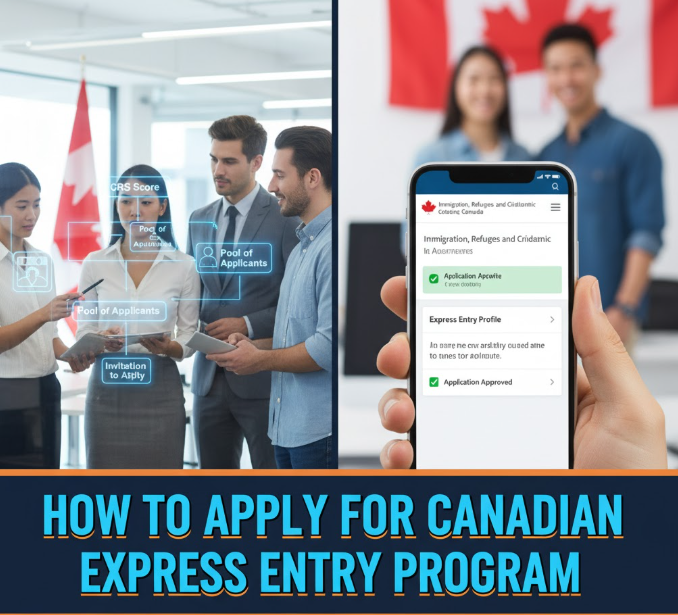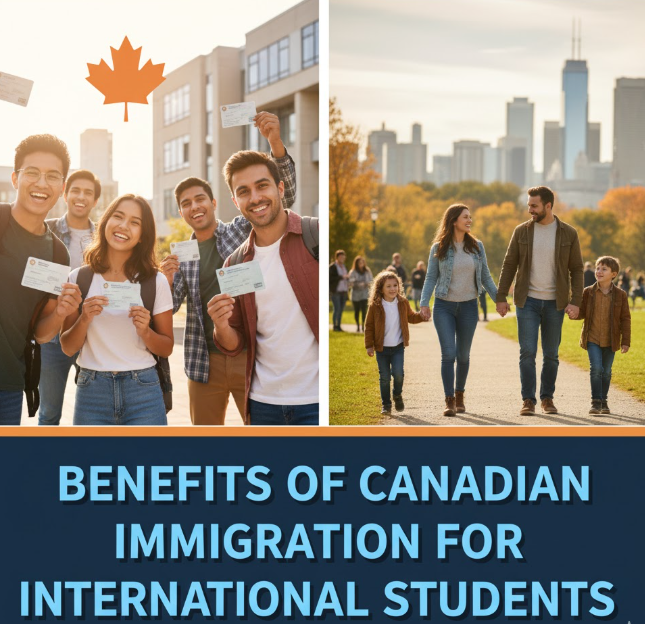For millions of people around the world, moving to Canada is a dream. Canada is one of the best places for a new start in life with its strong economy, stunning landscapes, great healthcare and tight-knit communities. If you’re considering doing this, the Express Entry process is likely your easiest option. It’s quick and simple, and has been designed to get skilled workers into Canada as soon as possible.
In this extensive guide, we’ll cover everything you need to know about the process of applying for Canadian Express Entry. Whether you’re just beginning to weigh your options, or you’re ready to apply, this article will provide all the information you need for success.
What Makes Express Entry Special
Express Entry is not just one more immigration program but the quickest and most popular pathway for skilled workers to move to Canada. The online system, introduced in 2015, is used to process applications for three primary immigration programs at the same time. Think of it as a virtual highway that bypasses Canada’s snail-pace road to Canadian permanent residence.
Express Entry is beautiful because of the pace. Whereas standard immigration applications could take years, Express Entry processes the majority within six months. That’s remarkably faster than elsewhere in the world when it comes to immigration systems.
Canada does this program because they require skilled workers. The nation suffers from labor shortages across many sectors, including the tech and health care industries as well as trades and engineering. By attracting talented people from the rest of the world, Canada continues to grow everything from its economy to its communities.
The Three Categories of Programs Within Express Entry
Express Entry controls three federal immigration programs. All of them are aimed at different kinds of workers, but all have the same end: Canadian permanent residency.
Federal Skilled Worker Program
This program is designed for individuals with considerable work experience in professional roles. You will have to work continuously in a skilled job for at least 12 months. Here your education, language skills and work experience all count.
To be eligible, you need to earn a certain amount of points by factors including your age, educational credentials, work experience and whether you have a job offer in Canada. The most successful candidates have university degrees and professional experience several years in length.
Federal Skilled Trades Program
This program is really for you if you’re involved in a skilled trade, such as plumbing, welding, cooking or electrical work. Canada desperately needs tradespeople and this program makes it easier for them to immigrate.
You must have at least two years of work experience in your trade over the past five years. You will also require a valid job offer from a Canadian employer or a certificate of qualification from a Canadian province or territory.
Canadian Experience Class
Already working or studying in Canada? This might be just the program for you. It’s for those with recent Canadian work experience who want to remain permanently.
You must have at least 1 year of work experience in the last 3 years (1,560 hours total/30 hours per week), and it should be full-time or an equal amount of part-time. Many are international students who have worked while studying, and they often use this program to become permanent residents.
The Comprehensive Ranking System Explained
The Comprehensive Ranking System (CRS) is the points based system applied to assess and score your profile and rank it in the express entry pool. Think of it like a points-based game, in which those higher scores will improve your chances of being invited to apply for permanent residency.
How Points Are Calculated
| Category | Maximum Points |
|---|---|
| Core human capital factors (Age, Education, Language ability, Work experience) | 500 points |
| Spouse or partner factors | 40 points |
| Skill transferability factors | 100 points |
| Additional (job offer/provincial nomination/Canadian education/sibling in Canada) | 600 points |
| Total possible score maximum | 1,200 points |
A number of factors can influence your CRS score. Youth is an asset — aspiring permanent residents between 20 and 29 years of age are awarded the maximum number of age points. Education counts, too — you earn more points for a master’s degree or PhD than a bachelor’s.
Language skills are huge. Getting top scores in an English or French language test can earn your total quite a few points. Experience at work counts, especially if you have worked in Canada previously.
The game-changer is a provincial nomination. If a Canadian province nominates you through its Provincial Nominee Program, you receive 600 extra points. This essentially ensures you will get an invitation to apply.
-
⚠️ Don’t make these common mistakes students make when applying to Canada — Check the list
Preparation: What You Need Beforehand
Before you fill out your Express Entry profile, collect all of your papers and take a few essential tests. Preparation is half the battle towards a smooth application process.
Language Testing
You need to have a valid results of the approved language test that shows how well you can communicate in English or French. For English, the majority of people choose to take either the IELTS General Training test or the CELPIP test. The TEF Canada or TCF Canada are accepted for French.
Schedule your test well in advance — but plan the next eight weeks with preparation. Prepare before your test as the scores on that are what count towards your CRS points. The higher the language scores, the more points and better chance of success.
Educational Credential Assessment
If you were educated outside Canada, you will need an Educational Credential Assessment (ECA). This assessment verifies that your foreign degree or diploma is recognized as being equivalent to a Canadian credential.
A number of bodies issue ECAs for Express Entry, including the World Education Services (WES) and International Credential Assessment Service of Canada (ICAS). This is a process that takes weeks, so don’t put it off. You will have to request that your school send you out transcripts and diplomas directly to the assessment body.

Work Experience Documentation
Compile evidence of all your employment experience. You will need reference letters from each employer that you mentioned in your application. These letters have to contain certain information: your job position, duties, the period of employment, hours per week and salary.
They need to be on company letterhead, signed by your manager or HR team. If it is really hard for you to get a letter like this from your current employer because (as I assume) you haven’t told them yet that you’re leaving, maybe explain in your application.
Proof of Funds
You need to prove that you have enough money for when you get to Canada, so that you can take care of yourself and your family. The number varies according to the size of your family.
| Family Size | Funds Required (in Canadian dollars) |
|---|---|
| 1 person | $14,690 |
| 2 people | $18,288 |
| 3 people | $22,483 |
| 4 people | $27,297 |
| 5 people | $30,690 |
| 6 people | $34,917 |
| 7 people or more | Add $4,826 for each additional family member |
You do not need to show proof of funds if you are already working legally in Canada, or if you have a job offer from a Canadian employer.
Step-by-Step Guide for How to Create Your Express Entry Profile
Now for the good stuff, making your Express Entry profile. Here is where your quest begins.
Step 1: Check Your Eligibility
Before you get going, it’s worth using the online tool on the Canadian government website to see if you can apply. Respond to questions about your age, education, work experience and language skills. It tells you which programs you are eligible for.
Step 2: Gather Your Information
Have these details ready:
- Your passport information
- Results of language tests and reference numbers
- ECA report and reference number
- Ten years of professional experience profile
- Education history
- Information of any accompanying family members
Step 3: Create Your Profile
Visit the Immigration, Refugees and Citizenship Canada (IRCC) website and register for an account. The online form inquires into your background with great detail. Please take your time and respond to every question honestly.
The system is fairly easy to use, though dates and numbers require attention. Mistakes can accumulate and cause trouble down the line. You will have the opportunity to save your progress and return to complete it later.
Step 4: Submit to the Pool
After you finish all sections, apply to be in the Express Entry pool. Your CRS score is computed by the system. Your profile remains in the pool for 12 months. If you’re not invited within that time frame, you’ll have to start a new profile.
What It’s Like in the Express Entry Pool
You submit your profile and join thousands of other people in the queue hoping for an invitation. But you can wait well — it does not mean doing nothing.
Regular Draws
Canada holds Express Entry draws on a regular basis, typically at least once every two weeks. At each draw, they invite the highest-ranked candidates to apply for permanent residency.
The number of invitations and the CRS score changes with every draw. Some rounds score just around 480, sometimes it’s above 500. The good news is that recent draws have had smaller minimum scores as Canada raises its immigration levels.
Improving Your Score While Waiting
Smart candidates deploy their waiting time effectively to increase their human capital (i.e., the CRS score):
Improve Your Foreign Language Skills: Taking the language module of your test a second time and doing better could bring you 20-50 more points. Even small improvements help.
Obtain a Job Offer: Gets 50 or 200 points for an eligible job offer in Canada. Try job boards including Indeed Canada, LinkedIn or industry-specific sites.
Apply for Provincial Nominations: Several provinces operate their own programs that are linked to Express Entry. Look up provinces that need workers in your field, and apply to their programs.
More Education: Obtain another degree or diploma before applying which can give you more points in education.
Boost Your Partner’s Profile: If your spouse or partner will also be joining you in Canada, increasing his or her language scores or education may increase the number of points on your application.
What Happens Once You Get an Invitation
Receiving an ITA is great, but the real hard work starts now. You have 60 days to apply for permanent residency from the date of the draw.
Gathering Final Documents
This is so they can confirm what you said on your Express Entry profile with official documents:
- Police certificates for every country in which you have lived in for 6 months or longer since the age of 18
- Approved panel physicians medical exams
- Proof of funds (bank statements, investment details)
- Copies of birth, marriage or divorce certificates
- Detailed employment reference letters
- ECA reports and original education documents
- Language test results
Medical Exams
Schedule your medical examination with an approved panel physician immediately after you receive the invitation. It will be several weeks before results reach IRCC and you’re not allowed to submit your application without the results.
It involves a physical examination, blood tests and chest X-rays. It costs about $200-400 per person given your region.
Police Certificates
Police certificates can take time to obtain — especially from countries with more stodgy bureaucracies. Begin as soon as you get your invitation.
A few countries will send the certificates directly to IRCC, rather than providing a copy to you. Review the requirements for each country you’ve lived in specifically.
Submitting Your Application
Submit all documents to your online profile. Ensure everything is legible, clearly expressed and correctly labeled. Pay the application fees:
- Processing fee: $850 CAD per adult
- Right of Permanent Residence fee: $515 CAD per adult
- Biometrics: $85 CAD per person
Once you apply, IRCC begins processing your application. They could ask for more information or documents. Act promptly on any requests to prevent holdups.
Current Processing Times And What To Expect
IRCC’s goal is to finalize the majority of Express Entry applications within six months. But times differ, depending on a couple of factors:
- How complete your application is
- How fast you respond to messages
- Background check complexity
- Current application volumes
While your application is being processed, you can check the status of your application online at anytime. IRCC updates you through your online account and email.
Common Mistakes to Avoid
A number of applications are delayed or denied over preventable errors. Here are some common mistakes to avoid:
Work Experience Letters Not Complete: Here you can find what your letters should contain. Generic letters simply stating that you worked there are insufficient.
Distorting Information: You should never lie or stretch the truth in your applications. The IRCC cross references everything and misrepresentation could lead to a 5-year ban from Canada.
Deadline Missed: You are allowed only 60 days to submit after receiving an ITA. If you miss this deadline, you lose your invitation and start again.
Poor Quality Documents: If documents are blurry scans or photos that can’t be clearly read, they cause delays. Scan all material at the highest resolution possible.
Incorrect File Formats: IRCC has very specific file formats. All documents must be saved in PDF format prior to uploading.
Not Updating Your Profile: If anything changes while you’re in the pool (new job, better language scores, a marriage!), update your profile! These shifts could work in your favor.
Special Considerations for Families
If you are applying with family members, there is more to think about.
Including Your Spouse or Partner
Your spouse or common-law partner may accompany you. Adding them to your profile might reduce your CRS slightly compared with applying alone, but they can also earn points through their education, language ability and work history.
You will require proof of your relationships: marriage certificate in the case of spouses, or proof you have lived together for at least one year, if it’s a common-law partnership.
Dependent Children
You may claim kids under 22 who are not married or in common law relationships. Children 22 or older can be included only if they are dependent on you for financial support because of a physical or mental condition.
All children must have their own medical examination, police clearance (if aged 18 or older) and supporting documents.

Provincial Nominee Programs: The Speediest Way
Not mandatory for Express Entry, but provincial nominations offer a whopping 600 CRS points – a de facto guaranteed invitation.
Every province has a variety of streams targeting different occupations or types of candidates. For example:
Ontario: Tends to pick candidates from the Express Entry pool who are employed in tech or skilled trades
British Columbia: Gives preference to healthcare workers, tech employees and people with job offers
Alberta: Strives for candidates that could fill labor shortages in its economy
Saskatchewan: Looks for work experience in in-demand occupations
Find out who needs workers in your sector, and apply directly to their PNP program while your Express Entry profile is live. For more information about Provincial Nominee Programs, visit the official IRCC website.
Costs Beyond Application Fees
Budget for these additional expenses:
- Language tests: $200-300 per test
- Educational Credential Assessment: $200-300
- Medical exams: $200-400 per person
- Police certificates: $50-150 per country
- Translation services (if documents are not in English/French): varies
- Settlement funds: as illustrated in the table of required amounts above
- Transport to Canada: flights, shipping crates, short-term housing etc
An average family will shell out $5,000-$10,000 CAD on the process before ever setting foot in Canada.
Life After Approval
If IRCC approves your application, you get a Confirmation of Permanent Residence (COPR) document and a permanent resident visa. You can enter before the date these documents expire.
An immigration officer at the Canadian border interviews you, briefly, and officially confers your permanent resident status. They will want to know your plans in Canada, as well as how much money you’re carrying.
Your PR card comes in the mail a few weeks later. This card serves as evidence of your status and permits you to return to Canada.
As a permanent resident you are entitled to:
- Live, work, study anywhere in Canada
- Access healthcare coverage
- Apply for citizenship after 3 years in Canada
- Be protected under the Canadian law and the Canadian Charter of Rights and Freedoms
Tips for Success
This is what successful Express Entry candidates do differently:
Start Early: Collect documents and take tests at least six months ahead of when you intend to apply.
Be Detailed: Fill out each section fully and supply all requested information.
Be Organized: Make a list and keep all the papers in organized digital folders.
Be Honest: Always be honest. Immigration fraud has serious consequences.
Seek Professional Assistance if Necessary: If your case is complicated, think about retaining the services of an immigration consultant or a lawyer.
Network: Become part of online forums and groups of Express Entry applicants. They provide valuable advice and news.
Do Your Research: Rely on the official government websites. Shun immigration scams and bad promises.
Frequently Asked Questions
How long does it take for the whole Express Entry process to be completed?
From setting up your profile to becoming a permanent resident, most go through the process in 8-12 months. This also includes the time candidates spent in the Express Entry pool (which changes) as well as the six months it will take to process applicants once invitations have been given.
Can I apply to Express Entry without a job offer?
Yes, absolutely. The majority of Express Entry applicants do not have job offers when they apply. A job offer gives you a few extra points, but it’s not necessary to have one for any of the three programs unless you want to apply through the Federal Skilled Trades Program (in which case an offer of employment is only optional if you have a certificate of qualification).
What if I have a low score under the CRS?
If your score is lower than recent cutoff scores, work on raising it. Rewrite the language tests, get more work experience or apply under provincial nominations. You can also develop a fresh profile after 12 months with updated information.
Am I able to keep working if my application is being finalized?
Not automatically. To work in Canada while your application is being processed, you must hold a valid work permit. But if you’re already in Canada working under a work permit, you can usually continue to do so.
What if I mess up on my application?
In addition, small errors may be able to be fixed via webform after submission. However, materially misrepresenting (lying about something important) can lead to application denial and a ban. If you realize there’s a mistake after you have submitted, alert IRCC right away with their webform.
Do I need to know French to apply?
No, French isn’t required. You can go through the whole process in English. But being proficient in both English and French gives your CRS points a massive boost, and puts you ahead of the game.
Can I list my parents or brothers and sisters?
No, only you and your spouse/partner and children. But if your siblings are Canadian citizens or permanent residents they can add 15 points to your CRS score. Parents can apply for permanent residency via alternative programs such as the Parents and Grandparents Program.
What are the jobs eligible for Express Entry?
These jobs must be classified as Skill Level 0, A, or B according to the National Occupational Classification (NOC) system. This includes management jobs, professional jobs that require a university degree, and technical jobs that require college education or training. Find the NOC code for your job on the Canadian government website.
Your Journey Starts Now
The process of applying for Canadian Express Entry can be quite intimidating, but when you break it down into steps, it’s actually not so bad. It’s something thousands of people do successfully every year, and with some diligent preparation, you can too.
Keep in mind that Canada actually desires skilled immigrants. The nation has ambitious immigration targets and requires the skills of people to take on positions, run businesses and participate in communities. The Express Entry system is supposed to make it faster and more efficient for would-be immigrants to come to Canada and of course, save the government time in processing applications.
Begin by finding out if you are eligible, collecting your documents and sitting for language tests. Create a powerful profile — with accurate info and high scores. As you wait in the pool, try to do something that can increase your CRS score. And when that invite comes, strike fast with a prepared and well-organized application.
You can really make this Canadian dream come alive for you. You will eventually master the system and begin your new life in what is still arguably one of the world’s most welcoming countries with patience, preparation and persistence. Best wishes for your journey to Canada!




